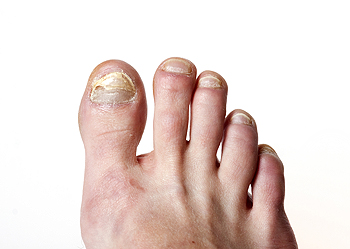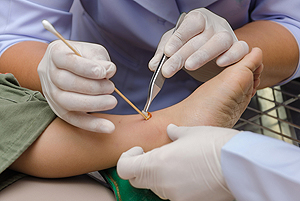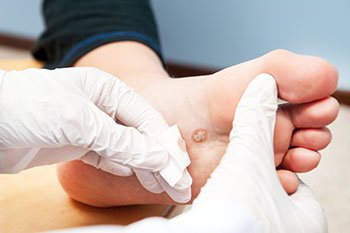November 2020
Fungal Infection and Other Causes of Thickened Toenails
Thickened toenails can be the first sign of several different foot conditions. Onychomycosis, or a fungal infection of the toenails, can make the toenails thick, crumbly, and discolored. Psoriasis is a skin condition that can cause the toenails to thicken and become deformed with tiny pits on their surfaces. While psoriasis is not a fungal infection, it can look like one, and may also make you susceptible to contract a fungal infection. Physical damage to the toenails, such as an injury, can even cause them to become thickened. Toenails tend to thicken and harden with age, and are especially common in elderly people. If you have thickened toenails, it is suggested that you consult with a podiatrist.
For more information about treatment, contact Genine Befumo, DPM of University Foot and Ankle Center, L.L.C. Our doctor can provide the care you need to keep you pain-free and on your feet.
Toenail Fungus Treatment
Toenail fungus is a condition that affects many people and can be especially hard to get rid of. Fortunately, there are several methods to go about treating and avoiding it.
Antifungals & Deterrence
Oral antifungal medicine has been shown to be effective in many cases. It is important to consult with a podiatrist to determine the proper regiment for you, or potentially explore other options.
Applying foot powder on the feet and shoes helps keep the feet free of moisture and sweat.
Sandals or open toed shoes – Wearing these will allow air movement and help keep feet dry. They also expose your feet to light, which fungus cannot tolerate. Socks with moisture wicking material also help as well.
If you have any questions please feel free to contact our office located in Monroe Township, NJ . We offer the newest diagnostic tools and technology to treat your foot and ankle needs.
Do Your Child's Feet Hurt?
What You Need to Know to Prevent Diabetic Foot Ulcers
People with diabetes are prone to developing diabetic foot ulcers, sores on the feet that can heal very slowly or may never heal at all. About 5% of people with diabetes develop chronic foot ulcers, which can cause complications such as infection and amputation. Preventing diabetic foot ulcers is of the utmost importance. If you have diabetes, it is necessary to know how to manage your condition. You should be aware of the medications that you take and their dosages, eat a balanced diet, take any prescribed supplements, see your doctor regularly, and monitor your foot health. A podiatrist can teach you how to perform daily foot checks to identify any cuts, scrapes, sores, or wounds on your feet early. The earlier these things are detected, the better they respond to treatment. A podiatrist can also teach you how to care for foot wounds at home. For more information about diabetic foot wounds, please speak with a podiatrist.
Wound care is an important part in dealing with diabetes. If you have diabetes and a foot wound or would like more information about wound care for diabetics, consult with Genine Befumo, DPM from University Foot and Ankle Center, L.L.C. Our doctor will assess your condition and provide you with quality foot and ankle treatment.
What Is Wound Care?
Wound care is the practice of taking proper care of a wound. This can range from the smallest to the largest of wounds. While everyone can benefit from proper wound care, it is much more important for diabetics. Diabetics often suffer from poor blood circulation which causes wounds to heal much slower than they would in a non-diabetic.
What Is the Importance of Wound Care?
While it may not seem apparent with small ulcers on the foot, for diabetics, any size ulcer can become infected. Diabetics often also suffer from neuropathy, or nerve loss. This means they might not even feel when they have an ulcer on their foot. If the wound becomes severely infected, amputation may be necessary. Therefore, it is of the upmost importance to properly care for any and all foot wounds.
How to Care for Wounds
The best way to care for foot wounds is to prevent them. For diabetics, this means daily inspections of the feet for any signs of abnormalities or ulcers. It is also recommended to see a podiatrist several times a year for a foot inspection. If you do have an ulcer, run the wound under water to clear dirt from the wound; then apply antibiotic ointment to the wound and cover with a bandage. Bandages should be changed daily and keeping pressure off the wound is smart. It is advised to see a podiatrist, who can keep an eye on it.
If you have any questions, please feel free to contact our office located in Monroe Township, NJ . We offer the newest diagnostic and treatment technologies for all your foot care needs.
Foot Conditions That Can Develop as Children Run Barefoot
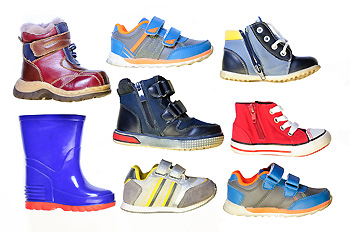 Summer is the season when children like to remove their shoes and run barefoot. Despite the freedom and enjoyment this can provide, there may be foot ailments that can develop. These can include insect bites, blisters, minor cuts and bruises. Sweaty feet may be prevented when a foot powder is applied at the beginning of the day. Splinters can also be a common condition among children, and there may be effective herbal remedies that can be applied for prompt removal. If you would like additional information about effective treatment techniques for minor wounds on children’s feet, please confer with a podiatrist.
Summer is the season when children like to remove their shoes and run barefoot. Despite the freedom and enjoyment this can provide, there may be foot ailments that can develop. These can include insect bites, blisters, minor cuts and bruises. Sweaty feet may be prevented when a foot powder is applied at the beginning of the day. Splinters can also be a common condition among children, and there may be effective herbal remedies that can be applied for prompt removal. If you would like additional information about effective treatment techniques for minor wounds on children’s feet, please confer with a podiatrist.
Making sure that your children maintain good foot health is very important as they grow. If you have any questions, contact Genine Befumo, DPM of University Foot and Ankle Center, L.L.C. Our doctor can provide the care you need to keep you pain-free and on your feet.
Keeping Children's Feet Healthy
Having healthy feet during childhood can help prevent medical problems later in life, namely in the back and legs. As children grow, their feet require different types of care. Here are some things to consider...
Although babies do not walk yet, it is still very important to take care of their feet.
Avoid putting tight shoes or socks on his or her feet.
Allow the baby to stretch and kick his or her feet to feel comfortable.
As a toddler, kids are now on the move and begin to develop differently. At this age, toddlers are getting a feel for walking, so don’t be alarmed if your toddler is unsteady or ‘walks funny’.
As your child gets older, it is important to teach them how to take care of their feet.
Show them proper hygiene to prevent infections such as fungus.
Be watchful for any pain or injury.
Have all injuries checked by a doctor as soon as possible.
Comfortable, protective shoes should always be worn, especially at play.
If you have any questions please feel free to contact our office located in Monroe Township, NJ . We offer the newest diagnostic and treatment technologies for all your foot and ankle needs.
Possible Treatments for Warts
Warts that develop on the bottom of the feet are known as plantar warts. They are caused by a virus and can be contagious. Symptoms of plantar warts include the appearance of potentially painful, hard, grainy, or fleshy warts on the sole of the foot. There are various treatments for plantar warts. One treatment that your doctor may use is freezing the wart with liquid nitrogen. The doctor will apply the liquid nitrogen to the wart, causing a blister to form there. After four to seven days, the blister will break, dry up, and fall off. Sometimes, a wart may need to be treated with liquid nitrogen several times to get full results. For more information about this and other treatments for plantar warts, consult with a podiatrist today.
Plantar warts can be very uncomfortable. If you need your feet checked, contact Genine Befumo, DPM from University Foot and Ankle Center, L.L.C. Our doctor will assist you with all of your foot and ankle needs.
About Plantar Warts
Plantar warts are the result of HPV, or human papillomavirus, getting into open wounds on the feet. They are mostly found on the heels or balls of the feet.
While plantar warts are generally harmless, those experiencing excessive pain or those suffering from diabetes or a compromised immune system require immediate medical care. Plantar warts are easily diagnosed, usually through scraping off a bit of rough skin or by getting a biopsy.
Symptoms
- Lesions on the bottom of your feet, usually rough and grainy
- Hard or thick callused spots
- Wart seeds, which are small clotted blood vessels that look like little black spots
- Pain, discomfort, or tenderness of your feet when walking or standing
Treatment
- Freezing
- Electric tool removal
- Laser Treatment
- Topical Creams (prescription only)
- Over-the-counter medications
To help prevent developing plantar warts, avoid walking barefoot over abrasive surfaces that can cause cuts or wounds for HPV to get into. Avoiding direct contact with other warts, as well as not picking or rubbing existing warts, can help prevent the further spread of plantar warts. However, if you think you have developed plantar warts, speak to your podiatrist. He or she can diagnose the warts on your feet and recommend the appropriate treatment options.
If you have any questions please feel free to contact our office located in Monroe Township, NJ . We offer the newest diagnostic and treatment technologies for all your foot and ankle needs.
How Are Corns Different from Calluses?
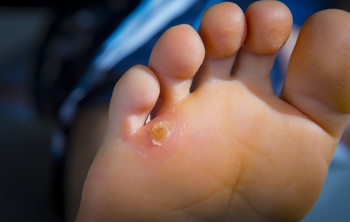 In podiatry, a corn is a small, circular lesion made up of hardened skin that can generally be found on the tops and sides of the feet or in between the toes. These lesions are called corns because they look similar to a corn kernel. Corns differ from calluses, another type of dry, hardened skin, by their central core of hard material. Corns on the feet are usually caused by repeated pressure or friction on the skin, like the kind you may get from wearing shoes that are too tight. Corns can sometimes be painful and inflamed. If you have corns on your feet and experience pain or discomfort, it is suggested that you see a podiatrist for treatment.
In podiatry, a corn is a small, circular lesion made up of hardened skin that can generally be found on the tops and sides of the feet or in between the toes. These lesions are called corns because they look similar to a corn kernel. Corns differ from calluses, another type of dry, hardened skin, by their central core of hard material. Corns on the feet are usually caused by repeated pressure or friction on the skin, like the kind you may get from wearing shoes that are too tight. Corns can sometimes be painful and inflamed. If you have corns on your feet and experience pain or discomfort, it is suggested that you see a podiatrist for treatment.
If you have any concerns regarding your feet and ankles, contact Genine Befumo, DPM of University Foot and Ankle Center, L.L.C. Our doctor will treat your foot and ankle needs.
Corns: What Are They? and How Do You Get Rid of Them?
Corns can be described as areas of the skin that have thickened to the point of becoming painful or irritating. They are often layers and layers of the skin that have become dry and rough, and are normally smaller than calluses.
Ways to Prevent Corns
There are many ways to get rid of painful corns such as wearing:
- Well-fitting socks
- Comfortable shoes that are not tight around your foot
- Shoes that offer support
Treating Corns
Treatment of corns involves removing the dead skin that has built up in the specific area of the foot. Consult with Our doctor to determine the best treatment option for your case of corns.
If you have any questions please feel free to contact our office located in Monroe Township, NJ . We offer the newest diagnostic and treatment technologies for all your foot and ankle needs.
Blog Archives
- April 2024
- March 2024
- February 2024
- January 2024
- December 2023
- November 2023
- October 2023
- September 2023
- August 2023
- July 2023
- June 2023
- May 2023
- April 2023
- March 2023
- February 2023
- January 2023
- December 2022
- November 2022
- October 2022
- September 2022
- August 2022
- July 2022
- June 2022
- May 2022
- April 2022
- March 2022
- February 2022
- January 2022
- December 2021
- November 2021
- October 2021
- September 2021
- August 2021
- July 2021
- June 2021
- May 2021
- April 2021
- March 2021
- February 2021
- January 2021
- December 2020
- November 2020
- October 2020
- September 2020
- August 2020
- July 2020
- June 2020
- May 2020
- April 2020
- March 2020
- February 2020
- January 2020
- December 2019
- November 2019
- October 2019
- September 2019
- August 2019
- July 2019
- June 2019
- May 2019
- April 2019
- March 2019
- February 2019
- January 2019
- December 2018
- November 2018
- October 2018
- September 2018
- August 2018
- July 2018
- June 2018
- May 2018
- April 2018
- March 2018
- February 2018
- January 2018
- December 2017
- November 2017
- October 2017
- September 2017
- August 2017
- July 2017
- June 2017
- May 2017
- April 2017
- March 2017
- February 2017
- January 2017
- December 2016
- November 2016
- October 2016
- September 2016
- August 2016
- July 2016
- June 2016
- May 2016
- April 2016
- March 2016
- February 2016
- January 2016
- December 2015
- November 2015
- October 2015
- September 2015
- August 2015
- July 2015
- June 2015
- May 2015
- April 2015
- March 2015
- February 2015
- January 2015
- December 2014
- November 2014
- October 2014
- September 2014
- August 2014
- July 2014

